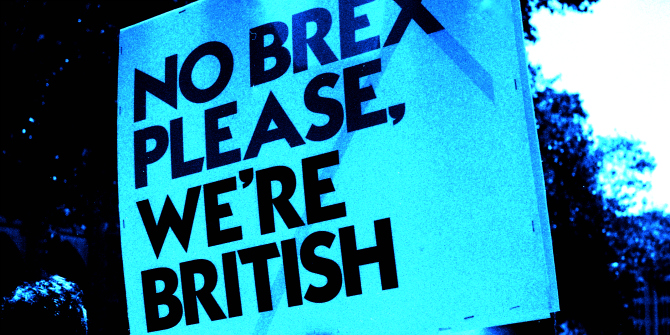 While the EU plays only a small role in traditional defence matters, its central place in the geopolitics of Europe means it plays a central part in the geopolitics that shape Britain’s security. Tim Oliver explains the implications of the upcoming referendum on shaping Britain’s defence strategy.
While the EU plays only a small role in traditional defence matters, its central place in the geopolitics of Europe means it plays a central part in the geopolitics that shape Britain’s security. Tim Oliver explains the implications of the upcoming referendum on shaping Britain’s defence strategy.
The issue of Britain’s relationship with the EU sits like an elephant in the room of UK’s ongoing Strategic Defence and Security Review, and review of its National Security Strategy. This is because Britain’s future relationship with Europe looks set to be one of the ‘unknown knowns’ of the review, something to be ignored or worked around because it is too politically contentious.
As a result, the strategies that will define Britain’s security and defence will be overshadowed by a debate and referendum that could tear apart the British government, consume the attention of Britain’s political elite, strain relations with Britain’s closest allies, and – should the British people vote to leave the EU – profoundly change Britain’s economy, identity and unity, and the geopolitics of Europe. Britain’s ‘European Question’ will therefore have implications for four of the UK’s core assumptions about its place in the world and the security and defence requirements that flow from them.
Great Power Status
While some of the predications about the economic and political costs to Britain from leaving the EU can be overly pessimistic, it is clear that there would be a cost.
First, Britain has long sought to use the EU and its economic might as one of the ways by which it pursues its aim of maintaining great power status. It is not the only way by which it can do this, but being able to draw on the economic power of the EU as a force multiplier has become increasingly central as Britain’s own economic and military capabilities have declined. Without the UK, France would become the de facto permanent EU representative on the UN Security Council, bolstering its claim to retain its permanent seat.
Second, other options for Britain to pursue great power status are limited or often overplayed. Talk of rebuilding the Commonwealth, of working more closely with the ‘Anglosphere’, of joining the USA in NAFTA, or of becoming a ‘Switzerland with nukes’ lack much credibility. Even if they worked out in the long-run, they would take time to unfold and consume time and effort to create.
Third, the UK’s attitude to the EU and now towards a renegotiation has left many of the UK’s closest allies in the EU feeling bruised and neglected. Britain has seemed more obsessed with minor issues of EU reform while the rest of the EU have been facing challenges such as the survival of the Eurozone, military tensions in Eastern Europe and a refugee crisis in the Mediterranean. While the rest of the EU has struggled to find unity on these problems, it has not passed unnoticed in EU capitals that the UK has shown little solidarity, preferring instead to isolate itself or offer at best token support. That the ‘British question’ has become a fourth problem facing the EU passes largely unnoticed in UK politics. Britain’s reliability as a partner who can be called upon is being thrown into question.
Fourth, any economic costs from a Brexit or uncertainty that accompany Britain’s renegotiation and referendum will add to pressures for further spending cuts across government. Defence – already a budget that has faced severe cuts – would be no exception.

Atlanticism
While the idea of Britain being some form of ‘transatlantic bridge’ has been overplayed, especially by British prime ministers, Britain does play a central role in the transatlantic relationship.
First, a British exit from the EU would remove the largest and keenest supporter of Atlanticism from Europe’s predominant political and economic organisation. It risks weakening the Atlanticism of the EU by producing shift in the balance of power within the EU, one towards an EU that is more inward looking and protectionist.
Second, the UK’s relationship with the USA would be strained by a Brexit. People in Washington D.C. already complain that Britain is spending too much time and effort on a renegotiation that is a side-show from such challenges as the heightened security concerns in Eastern Europe or North Africa. Only a few on the fringe of the political right in Washington D.C. think a Brexit would be a sound idea for the UK, USA, EU and transatlantic relations. The US has been a long-standing supporter of European integration and Britain’s involvement in it. A Britain that challenges both of these could find it damages both its relationship with the USA and the USA’s commitment to Europe.
Third, EU-NATO relations would be strained with no hope of much change in European defence cooperation or spending. A USA already exasperated by European freeriding on the US security guarantee could be tempted to care even less about the security of a Europe when its closest European allies cannot find the political will to create institutions that allow them to work together on shared economic, political and security challenges.
European Geopolitics
As should be clear, British demands for reform or a possible exit could change the geopolitics of Europe. Such changes are almost entirely overlooked in the UK’s debate despite such changes not being in the UK’s interests.
First, the area of Britain’s core external security concerns has always been and will remain Europe. As HM the Queen warned during a state visit to Germany in June of this year, the division of Europe is in nobodies interests and certainly not that of her own kingdom. While a British exit is not going to lead to war, it would add to strains on an organisation which however imperfect remains with NATO one of the two pillars on which European politics and security have been built since 1945 and 1989.
Second, Britain fails to appreciate how important a role it plays and could increasingly play in future. If projections are correct then by mid-century the UK could have the largest population in the EU. Such a Britain on the outside of the EU would help create a multi-polar Europe, with Britain, Russia and Turkey surrounding the EU. This raises the possibility of Europe becoming a contested space between the USA and Asian powers.
A United Kingdom
If the foremost concern of any state is its own survival then the European debate and referendum could undermine the unity of the UK.
First, the issue of Europe threatens to reignite the smouldering Scottish independence question. While Scottish pro-Europeanism can be overplayed, a vote by the rest of the UK to leave the EU while Scotland votes to stay would trigger a constitutional crisis that would lead to another independence referendum. The UK’s internal intergovernmental relations are already being strained by the prospect of renegotiation. As last year’s independence referendum made clear, a Scottish exit from the UK brings with it a host of costs for UK defence and security, most notably over Trident.
Second, the Northern Ireland peace process could be tested to breaking point by a Brexit. The Irish Republic has repeatedly warned that the economic and security implications for it and Northern Ireland mean that unlike over Scotland’s referendum it will make clear its position, and that position is a clear desire not to see a British withdrawal from the EU. A decent into violence in the province should not be overlooked.
Third, the European debate could tear apart HM Government. One of the main reasons why the UK is holding a referendum is because of internal tensions within the Conservative Party. It is doubtful that David Cameron can appease hard-core Eurosceptic members of his party while also managing relations with the rest of the EU. Whichever one he gives into first will not be pretty for either the UK’s international standing or for the running of a stable government at a time when the UK faces important questions for the future of its defence and security.
____
Note: the article represents the views of the author and not those of the British Politics and Policy blog nor of the LSE. Please read our comments policy before posting.
____
 Tim Oliver is a Dahrendorf Postdoctoral Fellow on Europe-North American relations at LSE IDEAS
Tim Oliver is a Dahrendorf Postdoctoral Fellow on Europe-North American relations at LSE IDEAS
Featured image credit: Torsten Reimer CC BY-NC 2.0








“If you cannot get rid of the people who govern you, you do not live in a democratic society”
If we actually had a say in this institution then this debate might be relevant. But the UK does not and I don’t know whether the phrase “Britain fails to appreciate how important a role it plays” is insulting or laughable. Since records began in 1996, the UK has not managed to prevent a single proposal placed in front of the Council of Ministers from becoming European law. This amounts to 55 measures that the UK opposed that have since become British law. Since 1973 the UK’s voting power in the Council of Ministers has decreased from 17% to 8%, in the European Parliament it has decreased from 20% to 9.5% and in the European Commission it has decreased from 15% to 4%. The UK has about 12% of the EU’s population, it provides only 5% of the EU’s staff and the situation is set to get worse. More than four in 10 British officials will be enjoying their retirement by 2020 and, based on the number of applicants in recent years, most of them will not be replaced (junior roles have only a 1.2% UK entrance rate). This is important because unlike in a democracy, EU law is written in the Berlaymont building by these unelected civil servants – the EU parliament can only rubber stamp or amend legislation. And speaking of this illusion of parliamentary democracy – Over the last European Parliamentary term (2009-14),a majority of British MEPs(across UK party lines) opposed 576 motions out of a total 1,936 that were put before the European Parliament .Of those 576 motions, 485 were nonetheless approved by the rest of the Parliament despite the opposition of a majority of British MEPs. This is a failure rate of 84%. This rises to 89% in Economic & Monetary affairs & 98% loss in Budget votes (so the 2nd largest net contributor to the EU budget gets a 2% say in how it is spent).We are the 2nd worst represented in the EU parliament after France with 839,194 inhabitants per MEP (Lux 76,667 per MEP, Ireland 350,750, Italy 816,000). So let’s bury the lie that the British have influence in the EU or that we have allies queuing up to support us.
And as for the security side, the EU has relied on the UK & US for its heavy lifting for generations. Perhaps it will have to break out the cheque book and spend on defence rather than featherbedding their populace with welfare. “The US has been a long-standing supporter of European integration and Britain’s involvement in it” – indeed like Michael Froman who worked for the EU – along with his wife – before joining the US government. But whether it suits the US state department or not to believe in the illusion that the UK actually has a voice in the EU (see above), cold hard cash will dictate that the US both signs a free trade pact with its largest inward investor, and will ensure the 2 Eyes relationship continues. I suspect when the US gets used to the fact that that Self Determination applies both to the mother country as well as the ex colonised they might appreciate a voice in the world that supports transatlantic-ism, rather than subsumes it in pan-EU “Solidarity”. I also suspect the upcoming UK defence review will have a significant impact on deliverable force which will please the US no end, EU armies which in the main act as an employment bureau for camouflaged bureaucrats anchored to logistics trains designed to re-fight Verdun or the 3rd Shock Army will continue to fail to impress the Americans regardless of whether we stay in this institution or not.
No the reason for a referendum is democracy. Democracy involves the right to remove those who rule you, and the likes of Junker, Shultz, Merkel cannot be removed by UK voters. Moreover it is about a connection between budget and taxpayers, when in the last 2 EU budget rounds the commissioner and parliament have refused to even speak with UK elected representatives – they did not need to because of caucus politics.
Democracy and its loss is not a game, its something that has been critical to the stability of Britain for centuries.
Germany and France are the go to powers of the EU, nobody seriously believes that the UK has influence.
For defence we do not have enough aircraft to defend ourselves, or even an aircraft carrier, that is not enough for even a medium sized power, but we can count on little support from pacifist EU that spends half as much per head, apart from reciprocal cooperation with France. As the net spend on Europe contributions is double the worst case tariff change I expect we will be in a better position not less. Those east European countries that have continually ganged up on the UK will have suddenly find that they actually have to be nice to the UK if we are then to help to defend them, and a proper two way relationship not just the anti anglo sneering we get at the moment is far more likely to be effective.
Well-said and all-true. Britons should remember, too, the fond dream of many that the UK might lead the EU politically into the 21st c. The EU badly needs that leadership, still — without it the Rest of the World faces two weakened leaders, Britain and the EU, not just one.